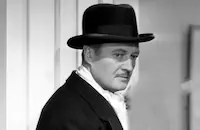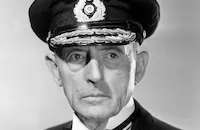Espionage

Brief Synopsis
Cast & Crew
Kurt Neumann
Edmund Lowe
Madge Evans
Paul Lukas
Ketti Gallian
Skeets Gallagher
Film Details
Technical Specs

Synopsis
When informant La Forge goes to rival Paris news bureaus to report that arms dealer Anton Kronsky is leaving Paris by train that night, bureau chief Alfred Hartrix can't send star reporter Patricia Booth because her passport has been revoked. She steals his passport, though, because it has an unrecognizable photo of him and his wife Sarah on it, then tricks Simmons, another reporter, into giving her the assignment. Meanwhile, rival bureau chief Doyle assigns famous novelist Kenneth Stevens to the story because his star reporter, Bill Cordell, wants to spend time in Paris with a new girl. On the train, after Kenneth's passport is stolen by a pickpocket and he rescues Pat from a man who tries to make a pass at her, he decides to be the "husband" on her passport. Not knowing his real identity and not revealing her own, Pat reluctantly agrees. That evening, after a shot narrowly misses Kronsky in the dining car, Kenneth wangles an invitation to Kronsky's private car by critiquing a composition Kronsky wrote for the violin, but is still unabale to find out where Kronsky and his companion Fleurette are headed. Later, Jimmy Brown, a laundry-owner from St. Louis, is found by Kenneth and Pat searching her compartment, but Brown's apparent drunkenness is accepted by them as an explanation. After Kenneth sneaks out of Pat's compartment, he is hit on the head and thrown into Kronsky's private car, then wakes up after Kronsky's aide throws a suitcase with a bomb in it out of the window. Kronsky holds Kenneth as well as Pat, thinking they are assassins, but Pat helps Kenneth to escape, then is let go by the Lucerne police the next day. After she leaves the station, it is revealed that the policeman as well as Brown work for Kronsky, and that Brown will follow Pat, hoping to locate Kenneth. In a pre-arranged meeting that afternoon, Kenneth approaches her in disguise, but, when she sees Brown, they pretend not to know each other. She then changes into a Swiss peasant costume while Brown approaches Kenneth, not knowing his identity, and asks him to follow Pat. At the cafe where Kenneth and Pat have agreed to meet, Brown and Maxie Burgos, a Russian passenger from the train, also arrive. As Brown tries to recruit Burgos to work for Kronsky, Pat and Kenneth conclude that Brown is the assassin. Then Kenneth, still in disguise, tells Brown that Pat is headed for Kronsky's villa, so Brown takes Burgos there, followed by Pat and Kenneth. Arriving at the villa, Brown sees a revolver in Burgos' pocket and secretly takes it before entering the house. Kenneth then gains entrance to the house by pretending to be a policeman who has captured Pat. They then overhear some men talking on the telephone ordering the end of production of all war materiels "on Kronsky's orders." It is finally revealed that Kronsky came to Brissac to marry Fleurette, who is really a Russian noblewoman who refused to marry him unless he stopped manufacturing arms. It is also revealed that Burgos is the real assassin. While Kenneth and Pat attempt to call their bureaus, they discover that Kronsky has released the information to the press himself. Pat and Kenneth also learn each other's real identities and, although they are arrested by Swiss police, their "crime" turns out to be a minor traffic violation involving a tandem and they are happily released after paying a five franc fine.

Director
Kurt Neumann
Cast

Edmund Lowe

Madge Evans

Paul Lukas

Ketti Gallian
Skeets Gallagher

Frank Reicher

William Gilbert
Robert Graves

Leonid Kinsky
Mitchell Lewis
Charles Trowbridge
Barnett Parker
Nita Pike
Juan Torena
George Sorel
Gaston Glass
Egon Brecher

Russell Hicks
Charles Williams

Ann Rutherford
Max Lucke
Michael S. Visaroff
Carlos J. De Valdez
Guy D'ennery
Gordon De Main
Gennaro Curci
Ramsey Hill
Albert Pollet
Lita Chevret
Jacques Vanaire
Andre Cheron
Christian J. Frank

Fred W. Malatesta
Jacques Lory
Eugene Beday
Carrie Daumery
Paul Weigel
Leo White
Gino Corrado
Francesco Maran
Eugene Borden
Sven Borg
William Von Brincken
Jean Perry
Robert Du Couedic
Albert Morin
Betty Blythe
Genaro Spagnoli
Otto Fries
George Davis
Herbert Corthell
Barbara Leonard
Torben Meyer
Enrico Ricardi
Walter Bonn
Jack Chefe
Crew
Dr. William Axt
Charles [g.] Clarke
James Dugan
Cedric Gibbons
Ainsworth Hackett
W. Donn Hayes
Eddie Imazu
Ray June
Leonard Lee
Harry Rapf
Manuel Seff
Douglas Shearer
Dolly Tree
Edwin B. Willis

Film Details
Technical Specs

Quotes
Trivia
Notes
According to contemporary news items in Hollywood Reporter, Charles Clarke replaced Ray June as the cameraman in late January 1937 due to June's illness, and Edmund Lowe took over the role of Kenneth, originally intended for William Powell.












